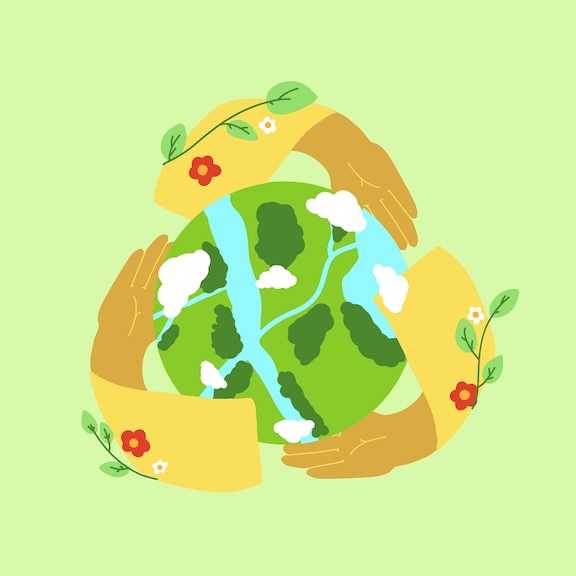A Circular Economy and Sustainable Future with the UVM Press
Making a smooth transition to circular systems will aid the restoration of planetary health as we know it.
By Marie Spaeth
There have been a multitude of attempts to improve resource production and consumption in order to provide a more sustainable economy for our society. To create change, it is essential to prioritize reuse, recycling, and regeneration to minimize waste and pollution. The University of Vermont (UVM) Press helps push this idea forward by dedicating its platform to advancing sustainability discourse, thereby playing a crucial role in making the concept of a “circular economy” a reality.
Making a smooth transition to circular systems will aid the restoration of planetary health as we know it. This transition begins with reducing carbon footprints and conserving resources. Reducing carbon footprints allows planetary health to be restored by minimizing greenhouse gas emissions for waste, resource extraction, and manufacturing. Climate change slows, and environmental degradation is reduced. Similarly, conserving resources through circular systems reduces the need for raw material extraction, which decreases habitat destruction, soil degradation, and water consumption. By maximizing the lifespan of materials through reuse and recycling, circular economies lessen environmental strain, thus allowing ecosystems to regenerate and thrive.
UVM Press forges the path to a circular economy through publishing research that informs policymakers, businesses, and individuals about sustainable practices. Its first published journal, Journal of Ecological Engineering Design (JEED), “aims to expand understanding of the science and design of ecosystem processes, functions, and services and to amplify the role of design as scholarship in academic and professional communities.” Journals like JEED aid the expansion of planetary health knowledge and foster an understanding of how human activities impact planetary health. With them, individuals and organizations can make informed decisions that promote ecological balance.
Additionally, by embracing digital-first publishing and a diamond open access model, UVM Press contributes directly to the circular economy by reducing the need for physical materials and lowering the environmental impact traditionally associated with academic publishing. These practices reduce paper waste, limit transportation emissions, and extend the accessibility and lifecycle of knowledge across communities worldwide. Open access publishing ensures that valuable research is not locked behind paywalls, enabling broader dissemination and reuse of information. This approach aligns circular principles by promoting the sharing and repurposing of intellectual resources, encouraging collaboration, and fostering innovation in sustainability practices across disciplines and sectors.
At the community level, individuals can contribute to a circular economy by making conscious consumption choices, supporting businesses that prioritize sustainability, and participating in local recycling and reuse programs. By taking simple actions, such as repairing items instead of discarding them or choosing products with minimal packaging, waste is collectively reduced. As more people embrace these habits, societal norms shift toward a culture of sustainability, reinforcing the benefits of circular economic models and fostering a healthier planet for all living beings.
Marie Spaeth is an undergraduate publishing intern for the UVM Press.
Illustration by Erone Stuff on Unsplash
